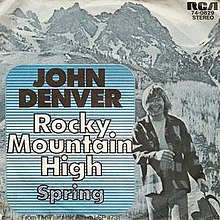Rocky Mountain High
| "Rocky Mountain High" | ||||
|---|---|---|---|---|
 | ||||
| Single by John Denver | ||||
| from the album Rocky Mountain High | ||||
| B-side | "Spring" | |||
| Released | October 30, 1972 | |||
| Recorded | August 1972 | |||
| Genre | Folk rock, country folk, country rock, soft rock | |||
| Length | 4:43 | |||
| Label | RCA Victor | |||
| Songwriter(s) | John Denver, Mike Taylor | |||
| Producer(s) | Milt Okun | |||
| John Denver singles chronology | ||||
| ||||
| Audio sample | ||||
"Rocky Mountain High"
| ||||
| Music video | ||||
| "Rocky Mountain High" (audio only) on YouTube | ||||
State song of | |
| Adopted | March 12, 2007 |
|---|---|
| Preceded by | Where the Columbines Grow (equal status as of 2007, first adopted 1915) |
"Rocky Mountain High" is a folk rock song written by John Denver and Mike Taylor and is one of the two official state songs of Colorado.[1][2] Recorded by Denver in 1972, it went to No. 9 on the US Hot 100 in 1973. Denver told concert audiences in the mid-1970s that the song took him an unusually long nine months to write. On April 10, 2017, the record was certified Gold by the Recording Industry Association of America for sales of 500,000 digital downloads.
Members of the Western Writers of America chose it as one of the Top 100 Western songs of all time.[3]
Background and writing[]
"Rocky Mountain High" was primarily inspired by John Denver's move to Aspen, Colorado, three years before its writing and by his love for the state. The seventh stanza makes reference to the destruction of the mountains' beauty by commercial tourism. The song was considered a major piece of 1970’s pop culture and became a well-associated piece of Colorado history.
The song briefly became controversial that year[when?] when the U.S. Federal Communications Commission was permitted by a legal ruling to censor music deemed to promote drug abuse[citation needed]. Numerous radio stations cautiously banned it[citation needed] until Denver publicly explained that the "high" was his innocent description of the sense of peace he found in the Rockies. In 1985, Denver testified before Congress in the Parents Music Resource Center hearings about his experience:
This was obviously done by people who had never seen or been to the Rocky Mountains, and also had never experienced the elation, celebration of life or the joy in living that one feels when he observes something as wondrous as the Perseid meteor shower on a moonless, cloudless night, when there are so many stars that you have a shadow from the starlight, and you are out camping with your friends, your best friends, and introducing them to one of nature's most spectacular light shows for the first time.[4]
In popular culture[]
After years as an unofficial anthem for Colorado, on March 12, 2007, the Colorado General Assembly made "Rocky Mountain High" one of two official state songs, sharing the honor with "Where the Columbines Grow".[1]
In late 2007, the John Denver Sanctuary in Aspen drew some controversy after the last lines of the song were removed from the "Rocky Mountain High" stone.[5]
"Rocky Mountain High" was used several times to foreshadow death in the 2000 film Final Destination, which revolves around the aftermath of an aviation accident (Denver died in a plane crash).
In his 1996 HBO special Back in Town, comedian George Carlin talks about sanctioning off the state of Colorado as a permanent prison farm for drug addicts and alcoholics, saying "this is the real Rocky Mountain High!"
The song was indirectly referenced in the movie Dumb and Dumber. In the movie, the character Harry (played by Jeff Daniels) comments on the flatness of what they thought was the Rocky Mountains, before Lloyd (played by Jim Carrey) remarks, "I was thinking the same thing. That John Denver is full of shit, man," seconds before they realize they went the wrong direction, towards the wheatfields of Nebraska.
Snowmass ski resort, near Aspen, named a run "Rocky Mountain High" in honor of John Denver.
Chart performance[]
| Chart (1972-1973) | Peak position |
|---|---|
| Australia (Kent Music Report) | 39 |
| Canada Top Singles (RPM)[6] | 8 |
| Canada Adult Contemporary (RPM)[7] | 2 |
| US Billboard Hot 100[8] | 9 |
| US Adult Contemporary (Billboard)[9] | 3 |
| US Cash Box Top 100[10] | 7 |
References[]
- ^ Jump up to: a b Brown, Jennifer (March 12, 2007). ""Rocky Mountain High" now 2nd state song". The Denver Post. Retrieved August 29, 2018.
- ^ "State Songs". Colorado.gov. Retrieved August 29, 2018.
- ^ Western Writers of America (2010). "The Top 100 Western Songs". American Cowboy. Archived from the original on 10 August 2014.
- ^ Eric D. Nuzum, Parental Advisory: Music Censorship in America, Harper (2001). ISBN 0-688-16772-1
- ^ Agar, Charles (October 13, 2007). "It's 'Rocky Mountain (expletive deleted), Colorado'". The Aspen Times. Archived from the original on February 23, 2012. Retrieved October 25, 2018.
- ^ "Top RPM Singles: Issue 4256." RPM. Library and Archives Canada. February 10, 1973.
- ^ "Top RPM Adult Contemporary: Issue 4272." RPM. Library and Archives Canada. February 24, 1973.
- ^ "John Denver Chart History (Hot 100)". Billboard. Retrieved March 19, 2015.
- ^ "John Denver Chart History (Adult Contemporary)". Billboard. Retrieved March 19, 2015.
- ^ Cash Box Top 100 Singles, March 10, 1973
External links[]
- Lyrics of this song at MetroLyrics
- All Music Guide 4.5/5
- 1972 songs
- 1972 singles
- John Denver songs
- Songs about Colorado
- Music of Colorado
- Symbols of Colorado
- United States state songs
- Songs written by John Denver
- Song recordings produced by Milt Okun
- RCA Records singles
- Environmental songs
- Songs about mountains